New research by SurveyMonkey shows that people prefer the content they consume to be backed by data, saying it makes the content more trustworthy and persuasive, if not more fun to read.
Using SurveyMonkey Audience, we asked more than 1,000 adults in the U.S. about how they consume content and about how data changes their perceptions of what they read. 82% of US adults say they’d prefer to read an article based on data rather than an article based on the writer’s opinion.
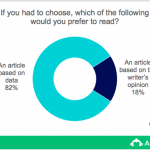
What’s more interesting is why they prefer data-backed content, what they consider to be trustworthy, and their sentiments about giving out their personal information in order to consume content.
The findings of this study have significant implications for marketers, journalists, or any other job focused on informing or persuading readers with content.
Most people consume news and entertainment content
Few people say they read research reports, company blogs, or eGuides—all mainstays in a content marketer’s toolbox.
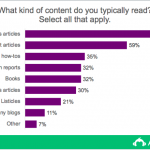
However, most people we surveyed are very regular consumers of content, reading news, magazines, online publications, social media, etc, every day.

Why do people prefer to data-backed content?
To most content consumers, data is a key indicator of trustworthy content. A full 75% of people said data-backed content was more trustworthy than content without data.
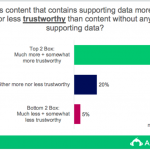
It stands to reason that if content is more trustworthy, then it’s also more persuasive. After all, practically nobody would be persuaded by content that they don’t trust.
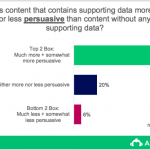
Sure, content with data is more persuasive and trustworthy but does that mean it’s more fun to read? Yes. Nearly half of our respondents said content that uses data is more fun to read than content that doesn't.
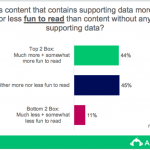
How do people like their data to be presented?
If you’re worried about boring your readers with content, our data suggests including a lot of charts, graphs, or infographics may be just the thing to help. 42% of people preferred data to be presented in that format, more than data presented as part of sentence, in a table or grid, or other means.
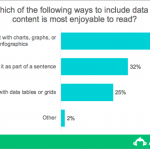
People pay attention to where you got your data
If you’re in the habit of making shady citations, then beware: 58% of US adults say they pay close attention to the data collection method or source when reading content that cites research or data.
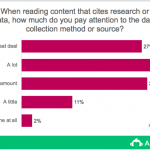
Using surveys to get your own original research is one of the most reliable, easiest way to get data to back up your most important content (if we do say so ourselves). Just make sure you make a good survey—people do look at how you run them and they don’t trust everything. For example, 66% of people say 1,000 or more respondents is the lowest sample size they’d trust in content that cites survey research and data.

Do your own original research with surveys
Our comprehensive content marketing guide will teach you everything you need to know to build surveys and create compelling content.
Where data is published matters to survey respondents. When asked which place of publication they would trust data from, external publications in news and media won by a big margin.
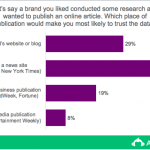
Should you gate your content?
Gating content, or asking for contact information from readers before they can look at the content, is a content marketing tactic as old as, well, content marketing. Most people have experienced it in one form or another. 87% of US adults have provided their email address to access content or join a newsletter/blog mailing list.
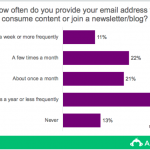
While not everyone would consider it “gated” content, newsletters are by far the most common type of content people give their contact information to access.
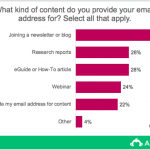
Finally, a reminder to focus on quality: Most people who access gated content say it's only somewhat valuable.
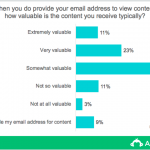
Methodology: This SurveyMonkey Audience study was fielded from August 6th to August 7th, 2018 with a representative U.S. sample of 1,054 adults aged 18-65. The sample was balanced by age and gender according to the US. Census.



